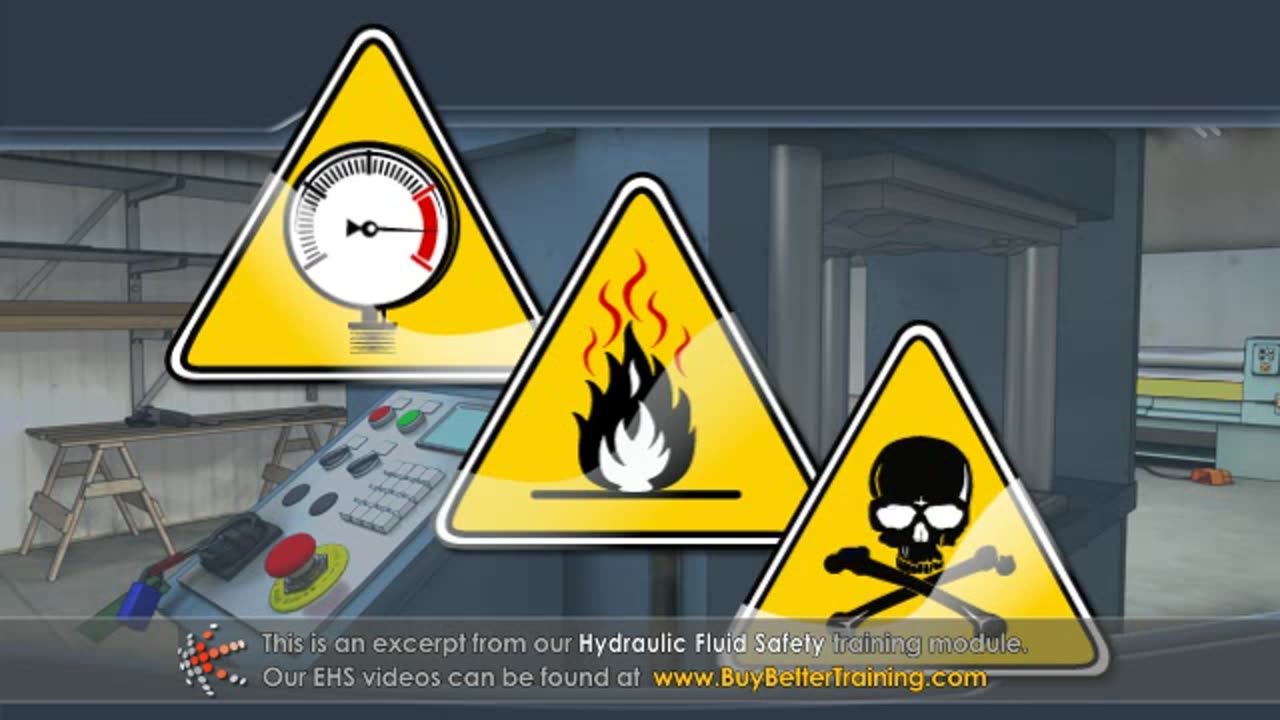Premium Only Content

Hydraulic Fluid Safety Training
**Hydraulic Fluid Safety Training** is designed to educate employees and operators about the potential hazards associated with hydraulic fluids, safe handling practices, and how to manage spills or accidents involving hydraulic systems. Hydraulic fluids are used in many types of heavy machinery and equipment, and improper handling or exposure can pose significant risks to health, safety, and the environment.
### Key Elements of Hydraulic Fluid Safety Training
#### 1. **Introduction to Hydraulic Fluids**
- **What is Hydraulic Fluid?**
- Explanation of hydraulic fluid, its composition, and its role in hydraulic systems, such as powering machinery, lifting loads, and controlling movement in equipment.
- Types of hydraulic fluids: mineral oils, water-based fluids, synthetic fluids, and bio-based fluids.
- **Common Uses of Hydraulic Fluids:**
- Used in construction equipment, agricultural machinery, forklifts, aircraft, and industrial machinery.
- Role in maintaining system pressure and lubricating components within hydraulic systems.
#### 2. **Hazards of Hydraulic Fluids**
- **Health Hazards:**
- **Skin Contact:** Prolonged contact with hydraulic fluid can cause skin irritation, dermatitis, or other allergic reactions. Some fluids contain harmful chemicals that can be absorbed through the skin.
- **Eye Exposure:** If hydraulic fluid splashes into the eyes, it can cause irritation or injury, depending on the fluid’s chemical composition.
- **Inhalation Risks:** Vapors or mist from heated hydraulic fluids can be harmful when inhaled, leading to respiratory issues or long-term lung damage.
- **Environmental Hazards:**
- **Spills and Leaks:** Hydraulic fluid spills can lead to soil and water contamination, which can harm wildlife and plants.
- **Flammability:** Many hydraulic fluids are flammable, and leaks or spills near heat sources can lead to fire or explosions.
- **Mechanical Hazards:**
- **Leaks and Pressurized Fluids:** Leaking hydraulic lines or faulty seals can lead to sudden release of pressurized fluid, which can be hazardous to both operators and nearby personnel.
#### 3. **Personal Protective Equipment (PPE)**
- **PPE for Handling Hydraulic Fluids:**
- **Gloves:** To protect hands from skin contact with hydraulic fluid. Nitrile gloves are often recommended for their chemical resistance.
- **Safety Goggles:** To protect eyes from fluid splashes or mist.
- **Protective Clothing:** Long-sleeved shirts, pants, and boots should be worn to prevent skin exposure. Aprons or chemical-resistant suits may also be necessary when dealing with larger quantities.
- **Respirators:** In areas with poor ventilation or when working with fluids that release hazardous fumes, respirators or masks may be required.
#### 4. **Safe Handling and Use of Hydraulic Fluids**
- **Proper Storage of Hydraulic Fluids:**
- Ensure hydraulic fluids are stored in clean, labeled, and secure containers to prevent leaks or contamination.
- Fluids should be stored in cool, dry areas, away from heat sources or direct sunlight to prevent degradation.
- **Handling and Transfer:**
- Use proper equipment (e.g., funnels, pumps) when transferring hydraulic fluids to avoid spills and overflows.
- Ensure containers are tightly sealed when not in use.
- When replacing hydraulic fluid, ensure the system is de-pressurized before opening any lines or caps to avoid sudden fluid release.
- **Avoiding Contamination:**
- Hydraulic systems must be kept clean to prevent contamination, which can lead to system failure or hazardous conditions.
- Only use approved hydraulic fluids for each specific application to maintain system efficiency and safety.
- Clean the area around equipment before replacing or adding hydraulic fluid to prevent contamination of the fluid.
#### 5. **Preventing and Managing Spills and Leaks**
- **Spill Prevention:**
- Inspect hydraulic systems regularly for leaks, cracks, or damage to hoses and fittings.
- Use secondary containment systems, such as drip pans or absorbent materials, to capture any potential spills during fluid replacement or maintenance.
- **Spill Response:**
- **Containment:** Immediately contain the spill using absorbent materials, barriers, or spill kits.
- **Clean-up:** Clean up the spill using appropriate materials (e.g., absorbent pads, dry sand). Ensure that all contaminated materials are disposed of according to local regulations.
- **Reporting:** Spills should be reported immediately to supervisors and, if necessary, to environmental authorities.
- **Emergency Procedures for Large Spills:**
- In case of a large spill, evacuate the area, secure the site, and call emergency response teams to handle the situation safely.
- For chemical spills, refer to the Material Safety Data Sheet (MSDS) for specific instructions on how to handle the fluid.
#### 6. **Hydraulic Fluid Fire Safety**
- **Flammability Risks:**
- Many hydraulic fluids are flammable, especially at higher temperatures. Operators should be aware of the fire risks when working with hot equipment.
- Fire prevention measures should be in place, such as ensuring that hydraulic fluid is not exposed to open flames or heat sources.
- **Fire Response:**
- If a hydraulic fluid fire occurs, use an appropriate fire extinguisher (e.g., Class B fire extinguisher for flammable liquids) to suppress the flames.
- Do not attempt to extinguish a hydraulic fluid fire with water, as this can spread the fire.
- **Prevention Measures:**
- Maintain a clean work environment to avoid leaks or spills near heat sources.
- Ensure that fire extinguishers and other emergency firefighting equipment are readily available and accessible in work areas.
#### 7. **Proper Disposal of Hydraulic Fluids**
- **Disposal Regulations:**
- Hydraulic fluids should never be disposed of in regular trash, drains, or landfills. Disposal must be done according to environmental regulations to prevent contamination of soil and water.
- Use designated disposal containers for used hydraulic fluids. These containers should be labeled clearly and sealed tightly.
- **Recycling and Reclamation:**
- Some hydraulic fluids can be recycled or reclaimed for reuse. Training on how to handle and store used fluids for recycling is essential.
- Companies should have a process in place to ensure that hydraulic fluids are disposed of responsibly, either through a licensed waste disposal company or a recycling facility.
#### 8. **Maintenance and Inspection of Hydraulic Systems**
- **Regular Inspections:**
- Regularly inspect hydraulic systems for leaks, worn seals, and damaged hoses to prevent fluid loss and ensure safe operation.
- Check fluid levels and quality to ensure optimal system performance. Contaminated or degraded hydraulic fluid should be replaced immediately.
- **Maintenance Procedures:**
- Follow the manufacturer's guidelines for routine maintenance and fluid replacement schedules to ensure the hydraulic system operates safely.
- Clean equipment and storage areas regularly to minimize the risk of contamination or spills.
#### 9. **Hydraulic Fluid Emergencies**
- **Emergency Response Plan:** Ensure that employees are trained on how to respond to hydraulic fluid emergencies, including spills, leaks, and exposure incidents.
- **First Aid for Exposure:**
- In case of skin contact: Immediately wash the affected area with soap and water. For significant exposure, seek medical attention.
- In case of eye exposure: Flush the eyes with clean water for at least 15 minutes and seek medical attention immediately.
- In case of inhalation: Move the individual to fresh air immediately. If symptoms persist, seek medical attention.
#### 10. **Regulations and Standards**
- **OSHA and EPA Regulations:** Ensure that employees are aware of relevant regulations, such as OSHA's standards for handling hazardous chemicals (29 CFR 1910.1200), and EPA regulations for the disposal of hazardous materials.
- **Manufacturer Guidelines:** Follow the equipment manufacturer's recommendations for fluid types, maintenance, and safety measures specific to each hydraulic system.
### Benefits of Hydraulic Fluid Safety Training
- **Reduced Health Risks:** Proper training helps prevent exposure to harmful chemicals, minimizing the risk of skin, eye, and respiratory issues.
- **Environmental Protection:** Proper handling and disposal practices help protect the environment by preventing contamination from spills and leaks.
- **Increased Equipment Longevity:** Maintaining clean systems and using the correct hydraulic fluid can prevent breakdowns and extend the life of equipment.
- **Regulatory Compliance:** Ensures that your business complies with health, safety, and environmental regulations, avoiding fines and legal issues.
- **Improved Workplace Safety:** Reduces the likelihood of workplace accidents related to hydraulic fluid exposure, spills, or fire hazards.
### Training Methods
- **Classroom Training:** This can cover theoretical knowledge about hydraulic fluid types, hazards, and safety protocols.
- **Hands-on Training:** Training operators in a controlled environment on how to handle hydraulic fluids, perform system inspections, and manage spills or leaks.
- **Simulation Exercises:** Running emergency scenarios to practice spill response, fire safety, and first aid for fluid exposure.
- **Ongoing Refresher Training:** Regularly updating employees on any new regulations, fluid types, and safety procedures to ensure continued safe practices.
Would you like help creating a customized **Hydraulic Fluid Safety Training** program for your organization?
-
 11:56
11:56
IsaacButterfield
1 day ago $0.14 earnedYou're Racist If You Don't Marry Your Cousin
1.05K2 -
 8:11
8:11
MichaelBisping
20 hours agoBISPING Reacts: 'Sign me UP!!' Charles Oliveira CALLS OUT Max Holloway for BMF TITLE FIGHT!
1201 -
 12:38
12:38
NC Dirt Hunter
23 hours agoIncredible Civil War relic sticking right out of the ground! Metal Detecting an old plantation.
2182 -
 44:36
44:36
TheTapeLibrary
15 hours ago $1.15 earnedThe DARK Truth About the Pollock Family Tragedy
5.01K4 -
 1:11:01
1:11:01
The Charlie Kirk Show
8 hours agoTHOUGHTCRIME Ep. 70 — Seatgate? Best Executive Orders? Panda Express?
96.1K13 -
 2:04:23
2:04:23
Kim Iversen
12 hours agoINCREDIBLE: Trump RELEASES JFK Files & BANS Central Bank Digital Currency
156K182 -
 1:12:22
1:12:22
Side Scrollers Podcast
15 hours agoThe Real Game Awards: Official Live Stream
100K15 -
 59:48
59:48
The StoneZONE with Roger Stone
8 hours agoJanuary 6 Victim Jeremy Brown Still in Jail Despite Trump Pardon | The StoneZONE w/ Roger Stone
61.4K12 -
 1:45:44
1:45:44
megimu32
9 hours agoON THE SUBJECT: Make 90s Movies Great Again
49.1K10 -
 59:46
59:46
Man in America
16 hours agoAI mRNA Vaccines, Turbo Cancer & Blood Clots... What Could Go Wrong?! w/ Tom Haviland
50.8K40